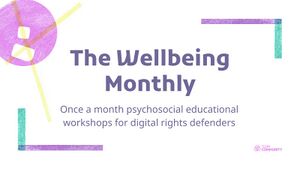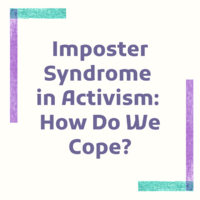Imposter Syndrome in Activism: How Do We Cope?
This session is part of The Wellbeing Monthly 2023, a monthly virtual workshop will be led by diverse mental health professionals, and will focus on psychoeducation and coping mechanisms on diverse topics including anxiety and fear, guilt and survivors guilt, defeat and hopelessness, trauma, and burnout and stress.
- Who: Khumo Masege
- Date: Tuesday, October 3
- Time: 9am EDT / 1pm UTC (What time is it in my city?)
- Language: English
- Location: Zoom
👉🏽 RSVP: https://digitalrights.formstack.com/forms/wellbeingmonthly4
Imposter Syndrome in Activism: How Do We Cope?
This workshop will briefly explore the systems that impact and perpetuate the experience of imposter syndrome in marginalized communities and activist spaces. We will build an understanding of what Imposter Syndrome looks like within the context of activism and build an understanding of its impacts and symptomatology before working through Skills for coping with, identifying and navigating when this shows up.
Participants will learn:
- What is Imposter Syndrome
- How does Imposter Syndrome Show up in Activism
- Impacts of Imposter Syndrome on self & activism work
- First Aid for navigating these effects
Presenter: Khumo Masege is a New York licensed psychotherapist, certified sexual health educator and Diversity/Equity Consultant based in Johannesburg, South Africa. Her background focuses on intersectional, anti-oppressive and social justice aligned therapy, and education. Her approach to healing is rooted in acknowledging the impacts of systemic oppression and its effects on marginalized BIPOC & Queer peoples mental and sexual health. Khumo’s lived experience both as a Nonimmigrant in the U.S for a decade and as a native to South Africa inform her perspectives around trauma, activism, wellness and the liberation of the global majority.
Notes & Resources
Resources & Presentation
Q&A Section
What does activism mean to you?
- Wanting to change things
- Activism means caring
- It gives me purpose in life
- Being in the world and of the world
How do we help of colleagues?
Validating them is very important, normalizing that we live in a system that is not kind. Achiving accomplishments is part of narratives that you are a valuable person if you achive things. Normalizing is not a "you" thing.
What can I do as small actions in my daily life to get over it?
Exploring what your impostor syndrome is telling you. If you have problems taking care of you, you have to explore those thoughts, what your body or your mind need. Building a community that can remind you about compassion is key too.
How to cope with Impostor Syndrome in local small group when we have a lot of things going on, we want to do things together but we want to take care of our mental health?
Since this is related with capacicy and with a logic group,I want to encourage you all to see your capacity needs individually so you see how to shape the project. You will aknowledge the parts that the group can't do so you can hold space to be compassionated with all of you individually.

